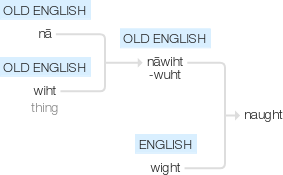Naught
Old English nāwiht, -wuht, from nā ‘no’ + wiht ‘thing’ (see wight).
wiktionary
From the Middle English naught, nought, naht, nawiht, from Old English nawiht, equivalent to "no wight". Doublet of nought.
etymonline
naught (n.)
mid-14c., "evil, an evil act," also " a trifle," c. 1400, "nothingness;" early 15c., in arithmetic, "the number zero;" from noht, naht (pron.) "nothing" (late 12c.), from Old English nawiht "nothing," literally "no whit," from na "no" (from PIE root *ne- "not") + wiht "thing, creature, being" (see wight). Also see nought.
Cognate with Old Saxon neowiht "nothing," Old High German niwiht, Gothic ni waihts, Dutch niet, German nicht. It also developed an adjectival sense in Old English, "good for nothing," which by mid-16c. had focused to "morally bad, wicked," though the modern adjective is naughty.
